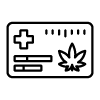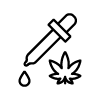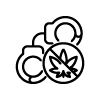Cannabis Laws in South Korea

Fully Legalized for Adult Use?

Fully Legalized for Medical Use?

CBD only?

Decriminalized?
Disclaimer: This information is provided for general informational purposes only and may not reflect the most current legal requirements in South Korea. Cannabislaws.global recommends you consult with a qualified local attorney or legal expert for accurate and up-to-date information. This information is not intended as legal advice and should not be relied upon as such. Use of this information is at your own risk.
Does South Korea have a recreational use program?
No, South Korea does not have a recreational use program. South Korea’s Narcotics Control Act prohibits recreational cannabis sales, use, possession, and growing.
Despite being among the first nations in Asia to legalize marijuana for medical purposes, South Korea’s drug culture still views marijuana negatively and prohibits its usage for recreational purposes.
In South Korea, the term “narcotics” means narcotic drugs, psychotropic substances, and cannabis. So, cannabis is not “narcotic drugs” nor “psychotropic substances,” but still treated as one of “narcotics” in its own right.
The Narcotics Control Act, Article 2, Section 4 defines cannabis as:
The term “cannabis” means any of the following substances: Provided, That this shall exclude the seeds and roots of the cannabis plant (referring to Cannabis sativa L.; hereinafter the same shall apply), the mature stalks of such plant, and the products manufactured using them:
- The cannabis plant and the resin extracted therefrom;
- All the products manufactured using the cannabis plant or its resin as their raw materials;
- Chemical compounds, similar to those specified in item (a) or (b), which shall be determined by Presidential Decree;
- A mixture or concoction that contains substances specified in items (a) through (c);
The Narcotics Control Act (2000), Article 2, Section 4 defines cannabis as:
The term “marijuana” means the hemp plant (Cannabis Sativa L.), the resin extracted therefrom, and all the products manufactured using the hemp plant or its resin as their raw materials: Provided, That this shall exclude the seeds and roots of the hemp plant, the mature stalks of such plant, and the products manufactured using them.
Does South Korea have a medical program?
Yes, medical cannabis is legal in South Korea. The government legalized medical marijuana under strict guidelines and on a case-by-case basis in 2018.
What are the rules for medical use?
First, the patient should submit an application to the Ministry of Food and Drug Safety. An application to obtain medicinal cannabis requires a general application form, a doctor’s diagnosis including dosage, as well as a patient’s medical records. Furthermore, the patient must possess a doctor’s note that claims no other substitute medicine is available.
Approval is granted on a case-by-case basis and is never guaranteed. Even if you have been previously approved by your home country for medicinal marijuana, you will need to go through the local medical system to receive the drug in South Korea.
Second, after the Ministry of Food and Drug Safety grants the patient permission, the patient can apply for a specific hemp medicine they need to the Korea Orphan Drug Center. This Center is a government institution that facilitates a patient’s access to stronger drugs.
The patient can get the hemp medicine only through the Korea Orphan Drug Center, and there is no other legal way to do it. The Center is in 6, Mugyo-ro, Jung-gu, Seoul. If the patient is too young or too sick to visit the Center to get the drug, then their family or nurse can visit the Center instead as their guardian. Such tight regulation demonstrates how cannabis is perceived by the medical community of South Korea, as well as the general population.
What are the qualifying medical conditions for eligibility?
- Lennox-Gastaut and Dravet syndromes
- Cancer
- Multiple sclerosis
- Weight loss
- Epilepsy
- HIV/Aids
What are the medical program limits?
Not all the hemp medicine can be given. The Korea Orphan Drug Center only uses four types of CBD medicines that are also legal in the United States, Canada, and many European countries.
- Epidiolex – to treat Dravet and Lennox-Gastaut syndromes
- Marinol – for cancer treatment-related nausea or weight loss
- Cesamet – for cancer treatment-related nausea or weight loss
- Sativex – for multiple sclerosis
Korean law bans imports and exports of cannabis to countries that have not fully legalized marijuana. This makes the process of finding products for legal import somewhat difficult.
What methods of use are permitted under the medical program?
No clear medical rules yet.
Is there home delivery for medical cannabis?
If medical cannabis is ordered online, patients must travel to the Korea Orphan Drug Center to arrange pick-up.
Is CBD legal in South Korea?
Yes, CBD is legal in South Korea, but should be medically prescribed and licensed.
Is cannabis decriminalized in South Korea?
No, cannabis is not decriminalized in South Korea. Cannabis use for recreational purposes is still illegal under the law.
A violation is punishable by up to five years in prison, or a fine of up to 50 million won (around 42,500 USD) as of November 2021. Sentences vary based on the person’s relation to the drug, which will be explained in further detail. Please read the following information carefully to avoid committing a cannabis-related crime in South Korea.
If you administer or possess marijuana: 8 months – 1 year and 6 months If you trade or assist in the trade of marijuana: 1 – 2 years
If you import or manufacture marijuana: 2 – 4 years
The sentences listed above can be increased or decreased according to various circumstances. For instance, the sentence would be increased if you are a habitual user, if you used it around the school zone, if you are a member of a large drug cartel, etc. But the sentence would be decreased if you used it the first time in your life, if you are willing to stop and go through the rehabilitation, if you were in an extenuating circumstance, etc.
It is also important to note that one action counts as one crime. If you smoked cannabis three times on the same day, that counts as three separate crimes and you will be punished accordingly. The reason the Korean government enforces this is because it is used as a determinant of one’s addiction level.
Disclaimer: This information is provided for general informational purposes only and may not reflect the most current legal requirements in South Korea. Cannabislaws.global recommends you consult with a qualified local attorney or legal expert for accurate and up-to-date information. This information is not intended as legal advice and should not be relied upon as such. Use of this information is at your own risk.

CannabisLaws.global
Your global guide to cannabis laws

